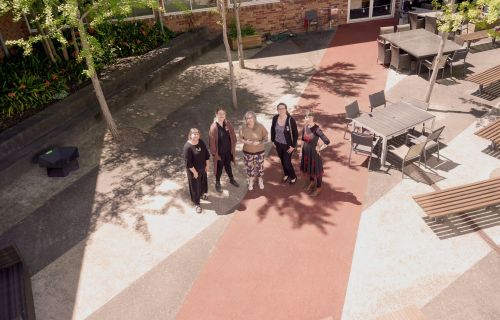More than a garden
With dappled sunlight shining through the trees in the Barkly Square courtyard, it’s no wonder Lou Ridsdale describes the space as “magical”.

The courtyard will soon be home to a First Nations Women’s Yarning Garden project, which will create a safe space for First Nations women to connect with each other, culture and Country, and build a bush garden from scratch.
Women’s Health Grampians and local community-led non-profit Food is Free Inc. are facilitating the project. It is one of 11 local projects selected for funding under the Empowering Grants program, a state government initiative delivered in partnership with the City of Ballarat and the Ballarat Empowering Communities Action Group.
The First Nations Women’s Yarning Garden project is the brainchild of Lou, the founder of Food is Free Inc., and Lyndel Ward, proud Gamilaraay woman and Women’s Health Grampians Health Promotions Officer.
“Lou and I have known each other for a very long time and together we had this dream of building an Indigenous garden for local First Nations women,” Lyndel says.
The project will aim to embrace all the benefits that come from connecting with others to grow your own food, including improvements in health, wellbeing and food security.
However, Lyndel believes the garden will have specific benefits for First Nations women.
“We’re looking at the benefits of gardening and traditional practices for First Nations women specifically, because we know connection to culture and Country has long-term mental health benefits,” she says.
A safe space
Lyndel says project participants would meet once a week for a couple of hours. The intimate setting will help the women feel safe and comfortable to ask questions and share their knowledge.
“There’s a lot of people who are very separated here in Ballarat, so that sense of community gives people more confidence that they know their place and that their Aboriginality is accepted and safe,” she says.
With a background in social work, Lyndel will also be on hand to make referrals to appropriate services if required.
“We know First Nations women face a lot of barriers to accessing things like primary health care or other support services, and we can provide those linkages,” Lyndel says.
“It’s so much more than a garden.”
Sharing culture and knowledge
The direction of the garden — the design, what is planted where and when — will be determined by participants. With a “huge amount of experience” in the group, Lyndel is excited to see how the garden comes together.
“We have women who have walked along the rivers with their nannies and learned about the plants to eat,” she says.
“There will be women from different countries, so hopefully we’ll be able to share that knowledge of gardening from different areas of Australia.”
The group will also incorporate traditional First Nations gardening tools into their activities. Wadawurrung Traditional Owners Aboriginal Corporation Project Officer Shannen Mennen, who will be participating in the garden project, is excited to learn more about native botanicals and foods.
“I have a very basic knowledge, but by no means am I an expert, so I’m very, very excited to find out what other women know and to learn alongside one another,” Shannen says.
“There’s a lot of plants I would like to see grown here and to find out more about their usage.”